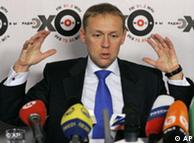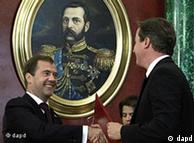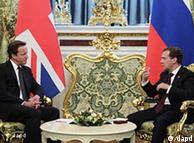DIPLOMACY | 12.09.2011
Differences persist as Britain and Russia seek reconciliation
British Prime Minister David Cameron and President Dmitry Medvedev on Monday vowed to repair ties but acknowledged a failure to solve differences over the 2006 London poisoning of a Kremlin critic.
Cameron's talks with Medvedev in the Kremlin and his later meeting with Prime Minister Vladimir Putin underscored Britain's desire to put its rocky relation with Moscow on a more pragmatic footing.
Cameron's trip was the first to Russia by a British prime minister since the 2006 death from radiation poisoning of former Russian spy and Kremlin critic Alexander Litvinenko in London. British-Russian relations have deteriorated since then, with Britain calling for the extradition of the chief suspect in the case.
President Medvedev said Russia would not extradite Andrei Lugovoy, ex-KGB bodyguard and current member of the Russian parliament, out of respect to "legal norms."
"A Russian citizen may not be extradited or handed over to a foreign state for legal proceedings or an investigation," he told reporters at the Kremlin on Monday.
 Andrei Lugovoy is wanted in the UK for the murder of Alexander LitvinenkoCameron said the Litvinenko case "has not been parked" but also said this did not mean the two countries would "freeze the entire relationship.
Andrei Lugovoy is wanted in the UK for the murder of Alexander LitvinenkoCameron said the Litvinenko case "has not been parked" but also said this did not mean the two countries would "freeze the entire relationship."While these difficulties and disagreements between us remain … that does not mean we should not pursue stronger business relations," he said. "If we can build a stronger relationship, I believe both our countries will gain."
No unity on Syria
Domestic pressure on Cameron to press the Litvinenko case remains high. Four former British foreign ministers published a joint letter on Sunday urging the prime minister to bring up human rights concerns with Medvedev, including the detention of businessmen Mikhail Khodorkovsky and Platon Lebedev, widely seen as politically motivated.
"These concerns need to be addressed before business can truly flourish," the former ministers wrote in a letter to the Sunday Times newspaper.
Medvedev and Cameron also discussed the ongoing crackdown on pro-democracy protesters in Syria by President Bashar al-Assad but acknowledged they could not resolve their differences.
Russia opposed a draft U.N. resolution backed by European nations and the U.S. that would impose an arms embargo and other sanctions on Syria. Medvedev said that Moscow believes that any U.N. resolution on its traditional Middle Eastern ally must be aimed at both the government and the opposition. The Kremlin therefore proposed a resolution demanding dialogue between the two sides.
Lucrative business deals
Cameron was accompanied by several business leaders on the trip, and signed business cooperation deals at the Kremlin worth some 215 million pounds (250 million euros/$340 million).
Among the business deals were the opening of nine new branches of Kingfisher, a British home improvement retailer, and a deal between Rolls-Royce and the Russian atomic energy agency Rosatom to collaborate on civil nuclear energy.
"Britain is our old economic partner, we are very glad to see you," Prime Minister Putin told Cameron, noting that in 2010, Britain was the top investor into the Russian economy.
Author: Andrew Bowen, Dagmar Breitenbach (AFP, AP, dpa, Reuters)
Editor: Mark Hallam
Editor: Mark Hallam



No comments:
Post a Comment